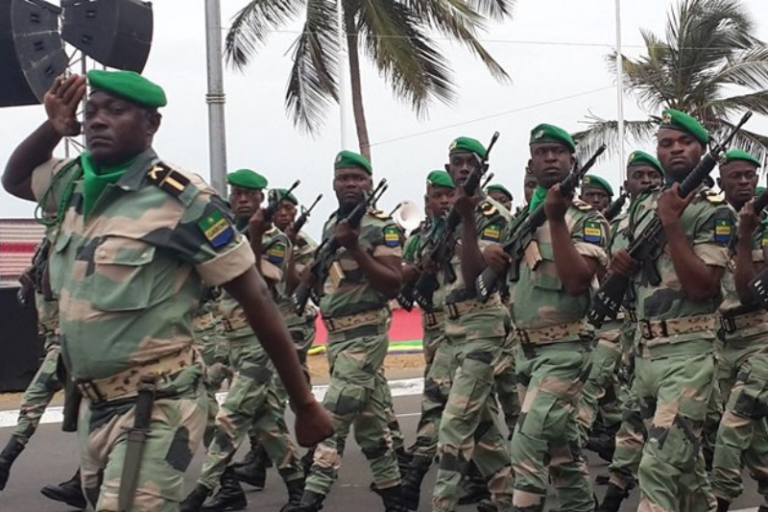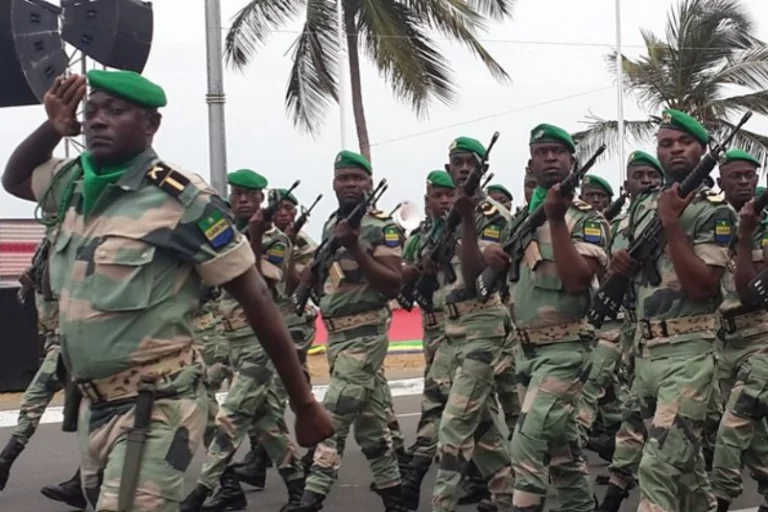

gabon in turmoil as military seizes power and president bongo under house arrest
A coup attempt has thrown Gabon into chaos, with a group of mutinous soldiers appearing on national television to announce the cancellation of recent election results and the dissolution of all state institutions. The announcement followed the re-election of President Ali Bongo Ondimba for a third term, a victory contested by the opposition, who labeled it a “fraud orchestrated” by the ruling party.
The soldiers, identifying themselves as part of the “Committee for the Transition and Restoration of Institutions,” declared the cancellation of the August 26, 2023, general elections and the closure of the country’s borders. Gunfire was heard during the televised announcement, indicating unrest in the Gabonese capital, Libreville. They claimed to be acting to “defend peace” by ending the current regime, dissolving institutions such as the government, Senate, National Assembly, and Constitutional Court.
President Ali Bongo Ondimba was reported to be under house arrest, and one of his sons had been arrested for “treason.” The situation was marked by a heavy presence of security forces on the streets of Libreville. The presidential guards appeared to have taken control of key locations, including the presidential palace, the National Assembly, and the Senate.
The international community responded with concern. China called for all parties to ensure President Bongo’s safety and restore normalcy through dialogue. France, the country’s former colonial power, stated it was closely monitoring the situation. The European Union’s foreign policy chief expressed worry over increased instability in the region due to successive military coups.
Foreign companies operating in Gabon reacted to the coup attempt. French oil giant TotalEnergies, which has a significant presence in the country, stressed the safety of its employees and operations. TotalEnergies has 45 petrol stations in Gabon and accounted for 0.6 percent of the company’s oil and gas output in 2022. French mining group Eramet suspended its operations in Gabon to ensure the safety of staff and operations.
Analysts highlighted that the coup in Gabon had unique characteristics. The coup was seen as a response to alleged irregularities in the electoral process rather than broader security and governance concerns. Dynastic politics, similar to those in neighboring countries, seemed to be driving public sentiment against the current regime.
In the past, France might have intervened militarily, but the country’s foreign policy toward Africa has evolved. France now emphasizes intervention upon the invitation of regional bodies or organizations such as the African Union or ECOWAS. The coup highlighted a growing trend of instability in the region due to factors such as economic stagnation, corruption, and maladministration.
The coup attempt threw Gabon into uncertainty, with celebrations reported on the streets of the capital. The situation raised concerns about the country’s stability and its future relationship with international partners. As events unfolded, the international community closely watched to see how the situation would develop and how Gabon’s political landscape would be reshaped.
The Somali president supports their military forces to eliminate the threats from Al-Shabaab, ISIS, and Al-Qaeda. The Somali National Army…
UAE President Sheikh Mohamed bin Zayed Al Nahyan held talks with President Faustin Archange Touadéra of the Central African Republic…
African football teams struggle intensely in the World Cup Qualification rounds to earn their place on the international football stage.…
The journey toward the 2026 FIFA World Cup is rapidly intensifying for all African teams, who now hold a historical…
The cricket authority in Zimbabwe will organize matches between top international teams in a major cricket event expected to succeed…
In 2025 the South African Social Security Agency (SASSA) announced its designated dates for social grant payments that benefits millions…
This website uses cookies.